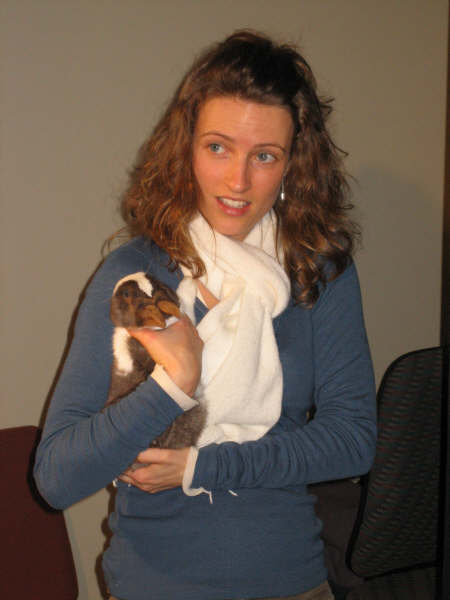4. Mad or Nomad
Despite the fact that I am only four weeks in to this course, I am painfully aware that at the end is the inevitable getting of a job, having a career, finding an occupation. Just in its self this is scary, but yesterday what came to mind was just how monotonous occupations are.
When humans were nomadic everything changed. For the hunter-gatherer no two days were the same: the horizon always changing as they traveled in search of food; new bird song to listen to as they moved from forest to savannah and the new seasons bringing new fruits.
In the past we consoled our selves with the knowledge that life for the hunter-gatherer was harsh. There was famine, drought and lions to contend with and all without the help of technology. But the evidence is now indisputable that in fact, life for the hunter-gatherer was easy, food abundant and time endless. It is thought that they only spent three to four hours a day hunting and gathering and the rest was just that. Rest.
For the hunter-gatherer Life was abundant. Before white settlers wiped them out, 70-60 bison roamed the North American prairies and ever since then we have been slowly, but surely wiping out hundreds of species every year. The mind boggles at just how much Life there must have been if we can manage to loose species at a rate of knots and there still be millions left.
But there was more than just food. The earth provided everything they needed. Millions of plants and animals from which to craft fur coats, massive forests proving all the materials needed to build shelter, rives and lakes and billabongs filled to over flowing with fresh water, and all under a dazzling sun. Yet, nomadic life has all but disappeared and in its place we have created the desk job, which has more to do with death than it does life.
So how the hell did we go from endless abundance, invigorating change and easy living to this? When and why did humans decided that they needed something other than Life to occupy their time? Did they decided at all, or was it a mistake, an experiment gone horribly wrong?
Some hunter-gathers are known to have farmed. In PNG they cleared small patches in the dense forest to plant crops which on their travels they would pass, gorge themselves on and then continue their journey. But why did such joyful and rewarding experiments get turned in to grueling work? More to the point, what could possibly make the Soul want to stifle the instinct to traverse the land, taste the new seasons fruit and rest during the heat of the day, and opt for the sedentary life style?
It is not that we have lost these urges. Holidays never come fast and often enough, we all could do with a little R and R and the travel bug, once caught, is a chronic condition.
So, if the instinct to live the nomadic life never left us, why have we lost sight of this way of life? Could it have been that somehow, at sometime in our history we forgot to heed our instinct? We forgot to listen when our instinct told us that nomadic life was better for the soul than tilling the fields all day in the hot sun, or that tilling fields was at least better for the soul than toiling at a desk?
I certainly can not think what else it could have been. There was no reason, nothing forcing such a change. It is only now that fresh water supplies are running low, that our land is so parched and silted that crops won’t grow, and that we are watching the earth's ecosystems collapse before our eyes. It is only now that Life is no longer abundant.
Why or what made humans stop listening to their instinct I will never know, but whatever it was I want no part of it. My nomadic instinct is still strong and while I know that I must soon find an occupation, I also know that I will never make a career out of it unless is fulfills this nomadic instinct.
Maybe it is this that has brought me here. Not so much to Dunedin, godforbid, but to learn the craft of Natural History Film-making. A craft in which, if I am lucky, I will visit new horizons, hear new bird songs and taste the new seasons fruit.
I wish me luck!



1 Comments:
I guess the cultivation of grain crops in the Middle-East some 10,000 years ago led to the realisation that larger populations could be sustained with agricultural rather than hunter-gatherer methods. Once these crops were planted, people needed to stay to tend to their growth and collection: reap and sow. By staying in the one place, people also started to domesticate animals - pigs, cattle, poultry, etc.
Revolutions have a tendency to sweep all before them and those who start out upon a revolutionary path rarely know where the path will lead.
Sitting at desks is just another point along this path. More in keeping with the results of the industrial and information revolutions, but still an expression of the push to specialisation.
Thus we get the Ministry of Funny Walks ala Monty Python. Economies are so specialised now that no academic or professional pursuit comes as much of a surprise. Hunting and gathering were the first broad categories of labour division. Basically comes down to: mass production and specialisation means more people get to live.
The Inheritors by William Golding is a novel with interesting ideas about early man's move to domesticated life, in this case at the expense of their Neanderthal cousins. The novel itself is not that great a read.
Post a Comment
<< Home